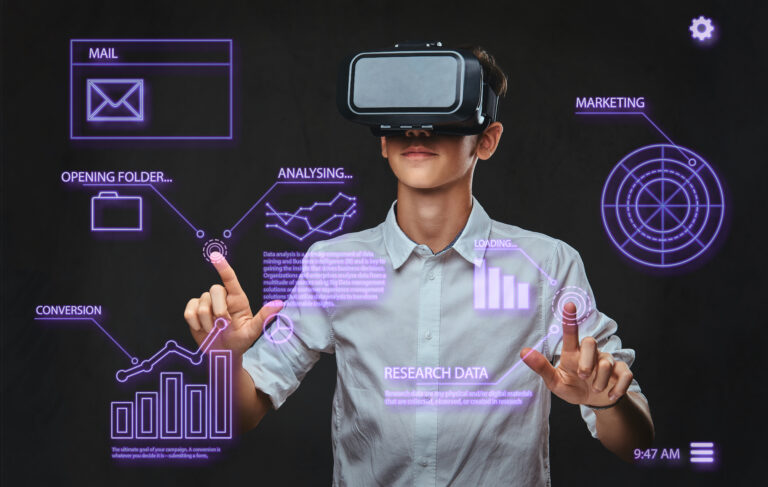Artificial Intelligence (AI) is revolutionizing medicine in ways that once seemed like the stuff of science fiction. Today, from early diagnosis to the development of personalized treatments, AI is transforming the way healthcare professionals work, streamlining processes, and improving the quality of care. Whether you’re a healthcare professional, a technology enthusiast, or simply interested in the future of healthcare, get ready to dive into a world where intelligent algorithms, data analytics, and machine learning come together to save lives and transform medicine.
The New Era of Digital Health
Medicine has historically been a field based on experience, intuition and knowledge accumulated over decades. However, with the advent of Artificial Intelligence , we have entered a new era, where access to real-time information and the ability to analyze large volumes of data allow for more accurate diagnoses and more effective treatments.
Imagine a world where an algorithm can detect subtle signs of disease in imaging scans that would otherwise go unnoticed by humans, or where predictive systems analyze a patient’s medical history to recommend personalized therapies. This is the reality that AI is bringing to modern medicine, promising not only to improve the efficiency of procedures, but also to save lives and reduce treatment costs.
The Role of Artificial Intelligence in Medicine
AI works on several fronts within the medical field, impacting both direct patient care and research and development of new therapies. Among the main areas of activity, the following stand out :
1. Diagnosis and Early Detection
One of the most critical challenges in medicine is early diagnosis of diseases. AI algorithms, trained on millions of images and clinical data, have demonstrated surprising results in identifying pathologies at an early stage.
-
Imaging:
AI-based tools such as X-ray, CT and MRI analysis systems help detect tumors, fractures and other abnormalities with high accuracy. These systems can identify patterns that are imperceptible to the human eye, enabling faster and more effective interventions. -
Diagnosis of Chronic Diseases:
By analyzing data from laboratory tests and medical histories, algorithms can predict the risk of developing chronic diseases, such as diabetes and heart disease, enabling preventive measures. -
Large-Scale Triage:
In high-demand environments, AI can help triage patients, prioritizing those at highest risk and optimizing the flow of care in hospitals and clinics.
2. Personalized Medicine and Tailored Therapies
The era of “one-size-fits-all medicine” is giving way to personalized approaches, where each patient receives treatments tailored to their individual characteristics.
-
Genomic Analysis:
With AI, it is possible to analyze large volumes of genetic data to identify mutations and predispositions to certain diseases. This enables the development of personalized therapies that take into account each patient’s genetic profile. -
Personalized Therapies:
Machine learning algorithms help create personalized treatment plans by considering factors such as age, family history, lifestyle, and response to previous treatments. This not only increases the effectiveness of treatments but also minimizes side effects. -
Continuous Monitoring:
Wearable devices and connected sensors provide real-time data on patients’ vital signs. AI analyzes this information and alerts doctors to potential complications, enabling immediate interventions.
3. Medical Research and Development of New Drugs
The process of discovering new drugs and therapies is traditionally time-consuming and costly. AI is revolutionizing this field by accelerating data analysis and identifying new therapeutic targets.
-
Drug Discovery:
AI algorithms can analyze chemical and biological databases to identify promising compounds that may act against specific diseases. This virtual screening process accelerates the early phase of drug development, reducing costs and research time. -
Simulations and Modeling:
AI enables the simulation of molecular interactions and the virtual testing of drugs, predicting their effectiveness and possible side effects even before laboratory tests are carried out. -
Clinical Trial Analysis:
During clinical trials, AI helps identify patterns and correlate patient data, helping to analyze results and adjust treatment protocols.
4. Decision-making Support and Hospital Management
In addition to direct patient care, AI plays a strategic role in the administration and management of healthcare services.
-
Bed Management:
AI systems can optimize bed allocation in hospitals by predicting peaks in demand and dynamically adjusting resources. -
Operational Data Analysis:
Business Intelligence tools integrated with AI help monitor performance indicators, identify bottlenecks and optimize administrative processes, reducing costs and improving the efficiency of healthcare services. -
Virtual Assistance for Healthcare Professionals:
AI-powered chatbots and virtual assistants offer real-time support to doctors and nurses, providing information on protocols, drug interactions, and scientific updates.
Benefits and Impacts of AI in Medicine
1. Improvement in the Quality of Service
With more accurate diagnoses and personalized treatments, patients benefit from high-quality care that not only improves clinical outcomes but also increases satisfaction and trust in the healthcare system.
-
Diagnostic Accuracy:
The ability to identify diseases at an early stage allows for rapid interventions, which is crucial for successful treatments and reducing complications. -
Tailored Treatments:
Personalizing treatments increases effectiveness and reduces the risk of side effects, providing a better quality of life for patients.
2. Cost Reduction and Resource Optimization
By automating processes and improving the efficiency of diagnostics and treatments, AI contributes to cost reduction in the healthcare sector.
-
Operational Economy:
Automation of administrative processes and intelligent resource management reduce waste and optimize the use of beds, equipment and medical personnel. -
Prevention and Reduction of Hospitalizations:
With early diagnosis and personalized treatments, the incidence of complications is lower, which reduces the need for hospitalizations and emergency interventions.
3. Advancement in Research and Innovation
AI accelerates the pace of innovation, enabling new drugs and therapies to be developed faster and more accurately.
-
Accelerated Innovation:
Drug discovery and development processes become more efficient, enabling innovative treatments to reach the market in less time. -
Global Data Integration:
The ability to integrate and analyze data from diverse sources enables the identification of global patterns, contributing to the advancement of evidence-based medicine.
4. Expanded Access to Health Care
With the support of wearable devices and AI-based applications, patients in remote regions or with limited access to medical services can have continuous monitoring and receive real-time health guidance.
-
Telemedicine and Virtual Consultations:
AI facilitates telemedicine, allowing healthcare professionals to treat patients remotely, reducing geographic barriers and improving access to healthcare. -
Education and Prevention:
Virtual assistants and health apps can educate patients about preventative care, promoting health and reducing the incidence of disease.
Challenges and Ethical Considerations in Medical AI
Despite significant advances, the implementation of Artificial Intelligence in medicine also brings challenges and ethical issues that need to be carefully evaluated:
1. Privacy and Data Security
The collection and processing of sensitive patient health data requires strict protocols to protect privacy and ensure information security.
- Encryption Measures:
It is essential to adopt advanced encryption technologies to protect stored and transmitted data. - Regulatory Compliance:
AI solutions must comply with legislation, such as the LGPD in Brazil and the GDPR in Europe, ensuring that patients’ rights are respected.
2. Transparency and Explainability of Algorithms
Many AI algorithms operate as “black boxes,” where it is not obvious how decisions are made.
- Explainability:
Developing systems that provide clear explanations about their decision-making processes is essential to increasing the confidence of healthcare professionals and patients. - Model Auditing:
Transparency in AI models allows them to be audited and validated, ensuring that decisions are fair and evidence-based.
3. Legal and Ethical Responsibility
In the event of errors or failures in AI-based diagnostics and treatments, the issue of legal liability becomes complex.
- Defining Responsibilities:
Clear guidelines need to be established that define who is responsible – whether the AI developers, healthcare professionals or the institutions that use it. - Ethical Use of Technology:
The implementation of AI should be guided by ethical principles, ensuring that the technology is used to benefit patients without discrimination or bias.
4. Integration with Clinical Practice
The adoption of AI-based solutions requires a change in clinical practice and in the training of healthcare professionals.
- Continuous Training:
Investing in training and constant updating is crucial for professionals to be able to use AI tools effectively. - Gradual Integration:
The transition to AI systems should be gradual, ensuring that the technology complements human expertise and does not completely replace it.
Future Trends in Medicine Driven by AI
As technology advances, we can expect AI to play an increasingly central role in medicine. Some of the future trends include:
1. Ultra-Personalized Diagnostics and Therapies
Advances in the analysis of genomic data and the development of predictive models will allow the creation of completely personalized treatments, where each patient will receive therapies adjusted to their unique biological characteristics.
2. Expansion of Telemedicine and Remote Monitoring
Wearable devices and smart apps will continue to evolve, enabling continuous monitoring of vital signs and facilitating remote care, which could transform access to healthcare, especially in remote areas.
3. Integration with Robotics and AI-Assisted Surgery
The integration between AI and robotics promises to revolutionize surgical procedures, with systems that offer millimetric precision and minimize operative risks, raising the safety and effectiveness standards of procedures.
4. New Research and Development Models
The acceleration of drug discovery and the development of new therapies will be driven by algorithms that analyze large volumes of data in real time, contributing to scientific advances that can transform the treatment of complex diseases.
5. Global Collaboration and Data Sharing
The globalization of health data and collaboration between medical institutions around the world will create a knowledge ecosystem that will drive innovation and improve standards of care on a global scale.
The Future of Medicine is Smart
Artificial Intelligence in Medicine is redefining the paradigms of the industry, transforming the way we diagnose, treat and manage patients’ health. From early disease detection to developing personalized therapies and optimizing hospital management, AI offers immense potential to improve the quality of care, reduce costs and drive innovation in healthcare.
For professionals, institutions and patients, the future of medicine is closely linked to the ability to integrate and harness advanced technologies. While ethical, legal and technical challenges still need to be overcome, the benefits already demonstrated indicate that the journey towards smarter, more efficient healthcare is just beginning.
If you are a healthcare professional, a manager or an innovation enthusiast, now is the time to embrace the possibilities that AI offers. Invest in training, participate in discussions on ethics and responsibility and explore the new tools that promise to transform medical practice. The future is bright, and Artificial Intelligence is the key to unlocking a new level of excellence in medicine.








